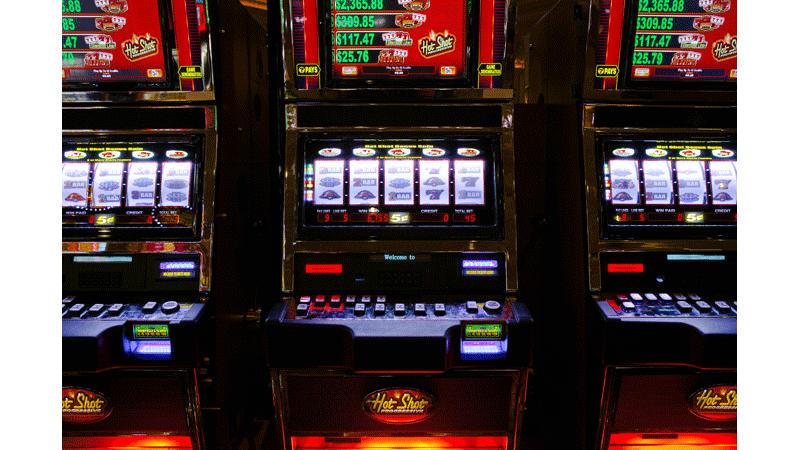Skill game legalization bill heads to Youngkin
Published 10:00 am Monday, March 18, 2024

- A General Assembly bill that would legalize and tax the so-called “skill game” betting machines is headed to Gov. Glenn Youngkin’s desk. (Photo courtesy of Metro Creative Graphics Inc.)
|
Getting your Trinity Audio player ready...
|
Virginia’s ban on the slots-style video games that have proliferated in truck stops and convenience stores may be short-lived.
A General Assembly bill that would legalize and tax the so-called “skill game” betting machines is headed to Gov. Glenn Youngkin’s desk.
State Senate Bill 212, sponsored by Sen. Aaron Rouse, D-Virginia Beach, passed the Senate in a 32-8 vote on Feb. 13 and passed the House of Delegates in a 51-45 vote on March 4 during crossover, when each chamber gets to vote on the other’s approved bills.
The bill, dubbed the Virginia Small Business Economic Development Act, authorizes the Virginia Alcoholic Beverage Control Authority to begin issuing provisional registration to skill-game distributors, operators and host establishments in July and directs the Virginia Lottery Board to develop regulations by Jan. 1, 2027, governing the machines’ use.
The bill, if signed by Youngkin, would repeal a 2020 law that had reclassified the pay-to-play machines as illegal gambling. Isle of Wight County only began enforcing the ban this January after a three-year court battle came to an end last fall.
In 2021, just as the 2020 ban was to take effect, Emporia truck stop owner Hermie Sadler sued the state in an effort to overturn the law, arguing it gave an unfair advantage to the handful of casinos authorized to operate in Virginia’s larger cities. Sadler and his attorney, state Sen. Bill Stanley, R-Franklin County, secured an injunction from Greenville County Circuit Court in late 2022 delaying the ban’s enforcement, though a trip of Virginia’s Supreme Court justices lifted the injunction roughly a year later, writing in an Oct. 13 opinion last year that the Greenville court had “abused its discretion.”
Under the current ban, according to a county news release from December, anyone operating a skill game could face a civil penalty of $25,000 per machine and criminal charges ranging from a Class 1 misdemeanor charge, which is punishable by a separate fine of up to $2,500 and/or up to a year in jail, to a Class 6 felony if they are convicted of being “an operator of an illegal gambling enterprise.” A Class 6 felony is punishable by up to five years in prison and/or a $2,500 fine. Playing a skill game is itself now a Class 3 misdemeanor, which carries a fine of up to $500 if convicted.
SB 212 would end the ban and authorize up to four skill game machines in any facility with an ABC retail license and up to 10 at any truck stop. Skill game machines would need to be certified as such at one of three laboratories and display decals bearing the Virginia state seal, the words “certified skill game machine,” and registration dates.
The bill would impose a 25% tax on the revenue generated by each machine. The tax is expected to bring in more than $126 million based on 2020 state estimates.
Three-fourths of the resulting tax revenue would be restricted to funding schools. Another 15% would be distributed to the machines’ host localities. Six percent would go to the ABC to cover administration costs. Local law enforcement agencies in the machines’ host localities and the Virginia State Police would each receive a 1% share. The remaining 2% would go to the state’s Problem Gambling Treatment and Support Fund.
State Sen. Emily Jordan, R-Isle of Wight, who’d voted in favor of the skill game ban as a delegate in 2020, this time joined with 19 Democrats and 13 other Republicans in support of legalization during the Senate vote. Jordan had faced Sadler as an opponent in a primary election in 2023 to decide the Republican nominee for the Senate race she ultimately won against former Del. Clinton Jenkins, D-Suffolk, last November.
Sen. Lashrecse Aird, D-Petersburg, whose legislative district includes Surry County, also supported the legalization bill.
Four Senate Democrats and four Republicans cast “nay” votes.
The pending legalization of skill game machines was not welcome news to all in Isle of Wight County.
“Unless it is demonstrated to me that these devices are properly regulated and taxed in the same manner the Virginia State Lottery and casinos are, I am opposed to them,” said Smithfield Mayor Steve Bowman. “I also do not like the fact that their presence encourages loitering in places of business that are not zoned for this type of activity.”
At the House level, 35 Democrats and 16 Republicans voted in favor of the legalization bill. Supporters included Del. Otto Wachsmann, R-Sussex, whose district includes part of Isle of Wight County, and Del. Kim Taylor, R-Petersburg, whose district includes Surry County. Thirty-one House Republicans and 14 Democrats voted against it. Del. Nadarius Clark, D-Suffolk, whose district includes part of Isle of Wight, was not present for the vote.




